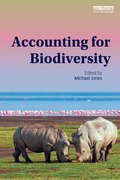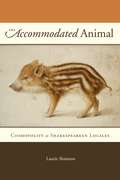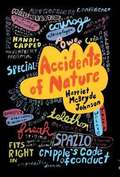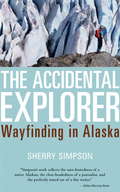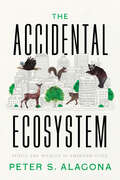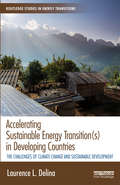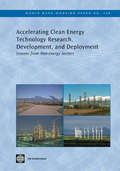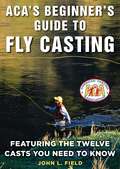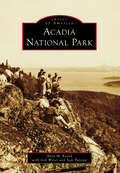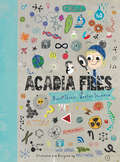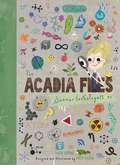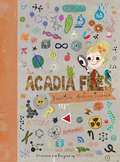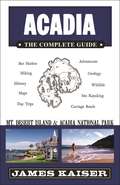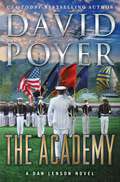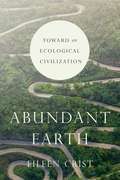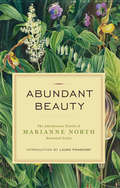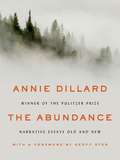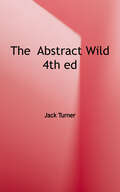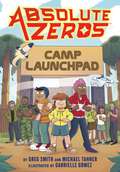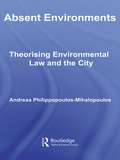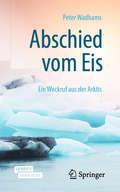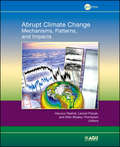- Table View
- List View
Accounting for Carbon
by Bellassen, Valentin and Stephan, Nicolas Valentin Bellassen Nicolas StephanThe ability to accurately monitor, record, report and verify greenhouse gas emissions is the cornerstone of any effective policy to mitigate climate change. Accounting for Carbon provides the first authoritative overview of the monitoring, reporting and verification (MRV) of emissions from the industrial site, project and company level to the regional and national level. It describes the MRV procedures in place in more than fifteen of the most important policy frameworks - such as emissions trading systems in Europe, Australia, California and China, and the United Nations Framework Convention on Climate Change - and compares them along key criteria such as scope, cost, uncertainty and flexibility. This book draws on the work of engineers and economists to provide a practical guide to help government and non-governmental policy makers and key stakeholders in industry to better understand different MRV requirements, the key trade-offs faced by regulators and the choices made by up-and-running carbon pricing initiatives.
Accounting for Biodiversity: Accounting For Biodiversity
by Michael Jones‘Biodiversity’ at its simplest, refers to the variety of species inhabiting Planet Earth. It is essential to the well-being of the planet. There is now a scientific consensus around the current ongoing crisis in biodiversity arising from both climate change and human activities. Experts believe we are in the middle of a mass extinction of biodiversity with devastating consequences for our planet. Accounting for Biodiversity explores the need for companies to actively protect, conserve and improve biodiversity within their sphere of operation. The 14 chapters written by a selected team of experts investigate the ways in which companies are embracing their responsibility through a variety of biodiversity initiatives and innovative models designed to improve the recording, reporting and valuing of biodiversity. Global case studies look at biodiversity accounting in Africa, Asia, Australasia, Europe and South America. Overall, this book provides a comprehensive set of reflections on accounting for biodiversity and recommendations for the future. This book is essential reading for all those interested in the contribution that accounting can make to the preservation of biodiversity. As we see increasing awareness of the importance of sustainability and ecological responsibility in business activity it is relevant and should prove informative to students, managers, accountants and those in business more generally. It is also important for all those interested in conserving biodiversity.
Accomplishing Climate Governance
by Harriet BulkeleyThis book provides a new approach to thinking about the politics and geographies of climate governance. It argues that in order to understand the nature and potential of the range of new responses to climate change emerging at multiple scales we need to examine how governance is accomplished - how it is undertaken, practised and contested. Through a range of case studies drawn from communities, corporations and local government, the book examines how climate change comes to be governed and made to matter as an issue with which diverse publics should be concerned. It concludes that rather than seeking the solution to climate change once and for all, we need to engage with the ways in which we can channel our intentions to ameliorate the climate problem to more progressive ends. The book will be of interest to researchers, advanced students and policy makers across the social sciences.
The Accommodated Animal: Cosmopolity in Shakespearean Locales
by Laurie ShannonShakespeare wrote of lions, shrews, horned toads, curs, mastiffs, and hellhounds. But the word OC animalOCO itself only appears very rarely in his work, which was in keeping with sixteenth-century usage. As Laurie Shannon reveals in "The Accommodated Animal," the modern human / animal divide first came strongly into play in the seventeenth century, with DescartesOCOs famous formulation that reason sets humans above other species: OC I think, therefore I am. OCO Before that moment, animals could claim a firmer place alongside humans in a larger vision of belonging, or what she terms cosmopolity. aWith Shakespeare as her touchstone, Shannon explores the creaturely dispensation that existed until Descartes. She finds that early modern writers used classical natural history and readings of Genesis to credit animals with various kinds of stakeholdership, prerogative, and entitlement, employing the language of politics in a constitutional vision of cosmic membership. Using this political idiom to frame cross-species relations, Shannon argues, carried with it the notion that animals possess their own investments in the world, a point distinct from the question of whether animals have reason. It also enabled a sharp critique of the tyranny of humankind. By answering OC the question of the animalOCO historically, "The Accommodated Animal" makes a brilliant contribution to cross-disciplinary debates engaging animal studies, political theory, intellectual history, and literary studies. "
Accidents of Nature
by Harriet Mcbryde JohnsonJean has cerebral palsy and gets around in a wheelchair, but she's always believed she's just the same as everyone else. She goes to normal school and has normal friends She's never really known another disabled person before she arrives at Camp Courage. But there Jean meets Sara, who welcomes her to "Crip Camp" and nicknames her Spazzo. Sara has radical theories about how people fit into society. She's full of rage and revolution against pitying insults and the lack of respect for people with disabilities. As Jean joins a community unlike any she has ever imagined, she comes to question her old beliefs and look at the world in a new light. The camp session is only ten days long, but that may be all it takes to change a life forever.
Accidental Wilderness: The Origins and Ecology of Toronto’s Tommy Thompson Park
by Walter H. KehmOnce referred to as Toronto’s “accidental wilderness,” Tommy Thompson Park is now recognized as a fortuitous urban miracle. Initially created as a landfill site on the city’s rapidly developing waterfront, the park’s physical and ecological footprint have grown dramatically. Forests, grasslands, and wildlife now thrive – all within a stone’s throw of some of the most densely populated areas of North America’s fourth-largest city. Accidental Wilderness is a rich and lyrical collection of essays curated by internationally recognized landscape architect and original designer of Tommy Thompson Park, Walter H. Kehm, complemented by a stunning collection of photographs by renowned landscape photographer Robert Burley. The book explores the city’s port origins; the park’s master plan principles and design; the native-plant succession process; the park’s unique flora and fauna; public advocacy; and public recreation in the park and its effect on mental, physical, and spiritual health. In an era where the looming dangers associated with climate change affect our daily lives, Tommy Thompson Park offers a hopeful narrative about how nature can flourish in, and contribute to, the well-being of twenty-first-century cities.
The Accidental Explorer: Wayfinding in Alaska
by Sherry SimpsonAlaska is a place of great adventure and exploration. After having lived in the Great Land for nearly all of her life, Sherry Simpson realized that she had not scaled mountains, trekked across wild tundra, or blazed trails through virgin forests. Did that fact make her less of an Alaskan? In the series of essays that comprise The Accidental Explorer, Sherry Simpson recounts the experiences of an ordinary woman confronting the great expanses of water and untracked land in Alaska, as she makes her best efforts to map her sense of place and her sense of self in a land that seems to require exploration of its inhabitants. While undertaking arduous treks into the backcountry, she falls into a glacial river and nearly drowns. On an archetypal epic solo hike, she ruminates constantly on when and whether she should abandon that folly. She writes with both humor and humility, harnessing great powers of observation of the natural world. In a downright scary encounter with a mildly aggressive bear, Simpson shrinks from any supposed Alaskan larger-than-life persona to assume her place on the food chain: an urbanized human who is appropriately afraid of big bears. Simpson also offers up the (less reverent) Alaskan view of Chris McCandles, the wanderer who perished in an abandoned bus near Denali, subject of Into the Wild by Jon Krakauer. Can an ordinary, not especially heroic, person be an adventurer? If she sets out, in a wild place like Alaska, what will she find out there, and what will she learn about the place back home? Throughout this compelling and probing book, Sherry Simpson illuminates the act of exploration as both a feat of extraordinary effort and as an everyday experience.
The Accidental Ecosystem: People and Wildlife in American Cities
by Peter S. AlagonaWith wildlife thriving in cities, we have the opportunity to create vibrant urban ecosystems that serve both people and animals.The Accidental Ecosystem tells the story of how cities across the United States went from having little wildlife to filling, dramatically and unexpectedly, with wild creatures. Today, many of these cities have more large and charismatic wild animals living in them than at any time in at least the past 150 years. Why have so many cities—the most artificial and human-dominated of all Earth’s ecosystems—grown rich with wildlife, even as wildlife has declined in most of the rest of the world? And what does this paradox mean for people, wildlife, and nature on our increasingly urban planet? The Accidental Ecosystem is the first book to explain this phenomenon from a deep historical perspective, and its focus includes a broad range of species and cities. Cities covered include New York City, Los Angeles, San Francisco, Pittsburgh, Austin, Miami, Chicago, Seattle, San Diego, Atlanta, Philadelphia, and Baltimore. Digging into the natural history of cities and unpacking our conception of what it means to be wild, this book provides fascinating context for why animals are thriving more in cities than outside of them. Author Peter S. Alagona argues that the proliferation of animals in cities is largely the unintended result of human decisions that were made for reasons having little to do with the wild creatures themselves. Considering what it means to live in diverse, multispecies communities and exploring how human and non-human members of communities might thrive together, Alagona goes beyond the tension between those who embrace the surge in urban wildlife and those who think of animals as invasive or as public safety hazards. The Accidental Ecosystem calls on readers to reimagine interspecies coexistence in shared habitats, as well as policies that are based on just, humane, and sustainable approaches.
Accelerating Sustainable Energy Transition: The challenges of climate change and sustainable development (Routledge Studies in Energy Transitions)
by Laurence L DelinaAccelerating sustainable energy transitions away from carbon-based fuel sources needs to be high on the agendas of developing countries. It is key in achieving their climate mitigation promises and sustainable energy development objectives. To bring about rapid transitions, simultaneous turns are imperative in hardware deployment, policy improvements, financing innovation, and institutional strengthening. These systematic turns, however, incur tensions when considering the multiple options available and the disruptions of entrenched power across pockets of transition innovations. These heterogeneous contradictions and their trade-offs, and uncertainties and risks have to be systematically recognized, understood, and weighed when making decisions. This book explores how the transitions occur in fourteen developing countries and broadly surveys their technological, policy, financing, and institutional capacities in response to the three key aspects of energy transitions: achieving universal energy access, harvesting energy efficiency, and deploying renewable energy. The book shows how fragmented these approaches are, how they occur across multiple levels of governance, and how policy, financing, and institutional turns could occur in these complex settings. This book will be of interest to students and scholars of energy and climate policy, development studies, international relations, politics, strategic studies, and geography. It is also useful to policymakers and development practitioners.
Accelerating Clean Energy Technology Research, Development, and Deployment
by Jonathan Coony Patrick AvatoClimate change is one of the key challenges of this century. At the same time, energy use-the primary source of climate-altering global greenhouse gas emissions-is increasing at unprecedented rates and is vital to the continued economic growth of developing countries. This poses a serious dilemma that can only be reconciled with new and improved clean energy technologies that balance climate change mitigation and increased energy needs in developing countries. Despite a recent increase in investment, public and private research, development, and deployment (RD&D) funding rates are well below historical levels. In addition, significant barriers impede the ability to develop new technologies, such as the uncertain future value of CO2 emissions, intellectual property rights issues, limited incentives to commercialize technologies for developing countries, and challenges with technology transfer. These factors must be overcome to accelerate innovation in the energy sector. To introduce new thinking to address these concerns, this report examines four cases from outside the energy sector where creative approaches to RD&D have successfully overcome similar barriers. The case studies review approaches to innovation by the Consultative Group on International Agricultural Research, Advanced Market Commitments for Vaccines, the Human Genome Project, and the concept of Distributed Innovation. These case studies show how creative efforts can generate valuable public goods via: (i) international partnerships between public and private actors, (ii) information sharing and intellectual property rights, and (iii) novel financing schemes.
ACA's Beginner's Guide to Fly Casting: Featuring the Twelve Casts You Need to Know
by John L. FieldIn The ACA's Beginner's Guide to Fly Casting: Featuring the Twelve Casts You Need to Know, John Field, tournament caster and FFI Master Casting Instructor, teaches and explains the fundamentals of fly casting, step by step. John shares the casting games of the American Casting Association and its 110 years of proven methods. This guide also includes learning tips from champion casters Steve Rajeff and Chris Korich. To begin, Field carefully lays out the essentials for getting ready, like assembling an outfit, and caring for your tackle. Next, he shows the simplest but most efficient way to start casting and practicing for results. Once you can make the basic cast, the next chapters provide the steps to achieve casting accuracy and distance. Whether learning to fly fish in fresh or saltwater, Field's expertise is sure to have you casting like a pro before you know it. With expert instructions, accompanying diagrams and fun drills, The ACA's Beginner's Guide to Fly Casting will help the next generation of flyfishers participate in this wonderful sport.
Acadia National Park (Images of America)
by Anne M. Kozak Josh Winer Sam PutnamMost histories of Acadia National Park chronicle the contributions of men in acquiring land, and while these contributions were critical, women also played a pivotal role. Some funded memorial paths, others facilitated George Dorr's acquiring land, and still others donated land. For people to enjoy the park and to find respite required developing infrastructure that provided easy access--a goal of Dorr, John D. Rockefeller Jr., and National Park Service directors Stephen Mather and Arno Cammerer. This book examines the role of women, the activities that characterize people enjoying the park, and the development of infrastructure, particularly the bridges and motor roads. Having access to two private photograph collections--those of the van Heerden family and Harold MacQuinn Inc.--as well as the photograph collection of Leo Grossman, the engineer for the Cadillac Mountain Road, has allowed us to use many previously unpublished images.
The Acadia Files: Book Three, Winter Science (The\acadia Files Ser. #1)
by Katie CoppensIn Book Three of the Acadia Files series, Acadia Greene carries her search for answers into winter. A melting snowman leads her—of course!—to explore climate change and how to reduce her carbon footprint. The helium balloons at her eleventh birthday party beg questions—naturally!—of molecular structure, weights of gases,and neutral buoyancy. An afternoon making paper airplanes brings discoveries in aerodynamics. Tracks in the snow raise questions of how animals survive the winter. And an afternoon of sledding slides right into an investigation of momentum, acceleration, and friction. Acadia doesn’t mean to do science—it just happens. She’s curious, determined, bold, and bright—a wonderful STEAM ambassador! The Acadia Files is a fun introduction to the wonders of science,using real-world scenarios to make scientific inquiry relatable and understandable. Parents and educators can use The Acadia Files to let kids discover for themselves what it’s like to be curious about the world and to satisfy that curiosity with scientific thinking.
The Acadia Files: The Summer Investigations (The Acadia Files #1)
by Katie Coppens Holly HatamThe Acadia Files: Summer Investigations presents five summer stories, each one followed by Acadia’s science notebook pages with her simple explanations and lively, whimsical drawings of natural phenomena. The Acadia Files is a fun introduction to the wonders of science, using real-world scenarios to make scientific inquiry relatable and understandable. Parents and educators can use The Acadia Files to let kids discover for themselves what it’s like to be curious about the world and to satisfy that curiosity with scientific thinking. Acadia Files for autumn, winter, and spring will follow on future lists. The Acadia Files: Summer Investigations offers an engaging new way to apply the scientific method to real-world scenarios. Great for teaching STEAM Acadia Greene wants answers. Who keeps stealing her blueberries just as they ripen on the bushes? Why is her hair curly? Why does the sun wake her up so early in the summer? Why does the tide submerge her sandcastles? How do rocks become sand? Acadia doesn’t set out to do science, but she has these important questions and her scientist parents refuse to simply feed her the answers. “Conduct an experiment,” they tell her. “Use the scientific method.” So Acadia gathers evidence, makes hypotheses, designs experiments, uses the results to test her hypotheses, and draws conclusions. Acadia does science.
The Acadia Files: Book Two, Autumn Science (The\acadia Files Ser. #1)
by Katie Coppens Holly HatamBooks that explore science through adventure The Acadia Files: Book Two, Autumn Science presents five stories of fall, each one followed by Acadia’s science notebook pages with her simple explanations and lively, whimsical drawings of natural phenomena. The Acadia Files is a fun introduction to the wonders of science, using real-world scenarios to make scientific inquiry relatable and understandable. Parents and educators can use The Acadia Files to let kids discover for themselves what it’s like to be curious about the world and to satisfy that curiosity with scientific thinking. Acadia Greene wants answers. What happened to the frogs she used to see at her favorite local pond? Why do leaves change color in the fall, and why don’t evergreen needles do the same? What is the water cycle, and what is transpiration? How do time zones work, and why does the sun set at different times in different places within a single zone? How do germs infect us? Acadia doesn’t mean to do science, but she has questions and her parents refuse to simply give her the answers. “Conduct an experiment,” they tell her. “Use the scientific method.” So Acadia makes hypotheses, designs experiments, analyzes data, and draws conclusions. Acadia does science. The author, Katie Coppens writes a recurring column for NSTA's middle school magazine Science Scope on science and literacy called "The Integrated Classroom."
Acadia: The Complete Guide: Mt Desert Island And Acadia National Park
by James KaiserThis gorgeous, full-color travel guide reveals the highlights and hidden gems of Acadia National Park and Mount Desert Island, Maine. From outdoor adventures (hiking, biking, sea kayaking, sailing) to the top lobster restaurants in Bar Harbor, Acadia: The Complete Guide puts the best of Acadia at your fingertips. Fascinating chapters on geology, history, ecology and wildlife bring the park to life. Over 20 detailed maps make travel planning easy. Written and photographed by Maine native James Kaiser, Acadia: The Complete Guide offers dozens of insider tips to help you make the most of your time in the park. Whatever your interests--driving the Park Loop Road, hiking to the top of Cadillac Mountain, biking the Rockefeller Carriage Roads, sailing past historic Bass Harbor Lighthouse--Acadia: The Complete Guide is the only travel guide you'll need. The Bestselling Guidebook to Acadia for over a Decade! Over 150 Color Photographs Over 20 Detailed Maps Fascinating Chapters on Geology, Ecology, Wildlife and History Detailed Info on Hiking, Biking, Sea Kayaking and Sailing Filled with Tips to Save You Time and Money!
The Academy: A Dan Lenson Novel (Dan Lenson Novels #22)
by David PoyerWith high ethical stakes and a suspenseful past-and-present narrative, The Academy is David Poyer's capstone novel in the Dan Lenson series.In his final tour of duty after a remarkable career at sea, Dan Lenson is appointed Superintendent of the US Naval Academy at Annapolis. He begins at a difficult time: Congress is cutting military budgets in the wake of the devastating world war with China, calls for radical reform are upending traditions, and Dan himself faces legal jeopardy for his actions during the war. And when a Category 5 hurricane threatens to overwhelm the coast, Dan must fight to rescue the Academy itself. Parallel to this narrative runs the dramatic story of Dan's years as a first class midshipman, 40 years ago. An Academy classmate commits suicide, and Dan is drawn into the investigation. The decisions he makes will affect his entire career and shape how he comes to lead troops in battle and at peace.
Abundant Earth: Toward an Ecological Civilization
by Eileen CristIn Abundant Earth, Eileen Crist not only documents the rising tide of biodiversity loss, but also lays out the drivers of this wholesale destruction and how we can push past them. Looking beyond the familiar litany of causes—a large and growing human population, rising livestock numbers, expanding economies and international trade, and spreading infrastructures and incursions upon wildlands—she asks the key question: if we know human expansionism is to blame for this ecological crisis, why are we not taking the needed steps to halt our expansionism? Crist argues that to do so would require a two-pronged approach. Scaling down calls upon us to lower the global human population while working within a human-rights framework, to deindustrialize food production, and to localize economies and contract global trade. Pulling back calls upon us to free, restore, reconnect, and rewild vast terrestrial and marine ecosystems. However, the pervasive worldview of human supremacy—the conviction that humans are superior to all other life-forms and entitled to use these life-forms and their habitats—normalizes and promotes humanity’s ongoing expansion, undermining our ability to enact these linked strategies and preempt the mounting suffering and dislocation of both humans and nonhumans. Abundant Earth urges us to confront the reality that humanity will not advance by entrenching its domination over the biosphere. On the contrary, we will stagnate in the identity of nature-colonizer and decline into conflict as we vie for natural resources. Instead, we must chart another course, choosing to live in fellowship within the vibrant ecologies of our wild and domestic cohorts, and enfolding human inhabitation within the rich expanse of a biodiverse, living planet.
Abundant Beauty
by Laura Ponsonby Marianne NorthIn 1871, Marianne North, a brilliant artist with a keen interest in botany, set-forth to travel the world on a quest to paint indigenous plants in their natural habitat. Encouraged by her friend Charles Darwin, North travelled by boat, train, mule, foot and palanquin to every continent except Antarctica. She circled the globe twice over fifteen years and accumulated an extensive and valuable collection of more than eight hundred paintings, which today comprise the esteemed Marianne North Gallery at the Royal Botanical Gardens at Kew, London.North - high-spirited, indefatigable, and brave - also kept detailed journals, which were posthumously published in three volumes in the late 1800s. Abundant Beauty collects the most engaging writings from those journals in one edition, including rich descriptions of botanica and delightful accounts of local people and customs from her sometimes dangerous travels. Abundant Beauty is a fascinating and informative read for botanists, gardeners, historians, and armchair travellers.
The Abundance: Narrative Essays Old and New
by Annie DillardIn recognition of the Pulitzer Prize-winning author's long and lauded career as a master essayist, a landmark collection, including her most beloved pieces and some rarely seen work, rigorously curated by the author herself."A writer who never seems tired, who has never plodded her way through a page or sentence, Dillard can only be enjoyed by a wide-awake reader," warns Geoff Dyer in his introduction to this stellar collection. Carefully culled from her past work, The Abundance is quintessential Annie Dillard, delivered in her fierce and undeniably singular voice, filled with fascinating detail and metaphysical fact. The pieces within will exhilarate both admiring fans and a new generation of readers, having been "re-framed and re-hung," with fresh editing and reordering by the author, to situate these now seminal works within her larger canon.The Abundance reminds us that Dillard's brand of "novelized nonfiction" pioneered the form long before it came to be widely appreciated. Intense, vivid, and fearless, her work endows the true and seemingly ordinary aspects of life--a commuter chases snowball-throwing children through neighborhood streets, a teenager memorizes Rimbaud's poetry--with beauty and irony, inviting readers onto sweeping landscapes, to join her in exploring the complexities of time and death, with a sense of humor: on one page, an eagle falls from the sky with a weasel attached to its throat; on another, a man walks into a bar.Reminding us of the indelible contributions of this formative figure in contemporary nonfiction, The Abundance exquisitely showcases Annie Dillard's enigmatic, enduring genius, as Dillard herself wishes it to be marked.
The Abstract Wild
by Jack TurnerIf anything is endangered in America it is our experience of wild nature—gross contact. There is knowledge only the wild can give us, knowledge specific to it, knowledge specific to the experience of it. These are its gifts to us. <p><p>How wild is wilderness and how wild are our experiences in it, asks Jack Turner in the pages of The Abstract Wild. His answer: not very wild. National parks and even so-called wilderness areas fall far short of offering the primal, mystic connection possible in wild places. And this is so, Turner avows, because any managed land, never mind what it's called, ceases to be wild. Moreover, what little wildness we have left is fast being destroyed by the very systems designed to preserve it. <p><p>Natural resource managers, conservation biologists, environmental economists, park rangers, zoo directors, and environmental activists: Turner's new book takes aim at these and all others who labor in the name of preservation. He argues for a new conservation ethic that focuses less on preserving things and more on preserving process and "leaving things be." He takes off after zoos and wilderness tourism with a vengeance, and he cautions us to resist language that calls a tree "a resource" and wilderness "a management unit." <p><p>Eloquent and fast-paced, The Abstract Wild takes a long view to ask whether ecosystem management isn't "a bit of a sham" and the control of grizzlies and wolves "at best a travesty." Next, the author might bring his readers up-close for a look at pelicans, mountain lions, or Shamu the whale. From whatever angle, Turner stirs into his arguments the words of dozens of other American writers including Thoreau, Hemingway, Faulkner, and environmentalist Doug Peacock. We hunger for a kind of experience deep enough to change our selves, our form of life, writes Turner. Readers who take his words to heart will find, if not their selves, their perspectives on the natural world recast in ways that are hard to ignore and harder to forget.
Absolute Zeros: Camp Launchpad (Absolute Zeros #1)
by Einhorn's Epic Productions Greg Smith Michael TannerReach for the stars in this exciting graphic novel about three ambitious, space-loving kids who must put their differences aside to save their summer camp before it closes...for good. Welcome to Camp Launchpad! Summer is in full swing, which means a new class of kids has arrived to attend the best space camp in Florida...or at least, it used to be. With growing competition from the trendy rival camp next door, Camp Launchpad needs all the help it can get to keep its doors open. Campers Val, Mark, and Pete are here for very different reasons: following in the footsteps of an astronaut mom, living up to expectations as a vice president&’s son, or getting a once-in-a-lifetime scholarship. But they all have one huge thing in common: Their future in the stars launches from here...if there&’s still a camp to launch from. When the hotshot owner of the rival space camp makes a ten-million-dollar bet that could turn Camp Launchpad around, this unlikely trio must band together to pull off a miracle. If they don&’t, this could be Camp Launchpad&’s last summer ever!
Absent Environments: Theorising Environmental Law and the City (Law, Science and Society)
by Andreas Philippopoulos-MihalopoulosOffering a novel, transdisciplinary approach to environmental law, its principles, mechanics and context, as tested in its application to the urban environment, this book traces the conceptual and material absence of communication between the human and the natural and controversially includes such an absence within a system of law and a system of geography which effectively remain closed to environmental considerations. The book looks at Niklas Luhmann's theory of autopoiesis. Introducing the key concepts and operations, contextualizing them and opening them up to critical analysis. Indeed, in contrast to most discussions on autopoiesis, it proposes a radically different reading of the theory, in line with critical legal, political, sociological, urban and ecological theories, while drawing from writings by Husserl and Derrida, as well as Latour, Blanchot, Haraway, Agamben and Nancy. It explores a range of topics in the areas of environmental law and urban geography, including: environmental risk, environmental rights, the precautionary principle, intergenerational equity and urban waste discourses on community, nature, science and identity. The author redefines the traditional foundations of environmental law and urban geography and suggests a radical way of dealing with scientific ignorance, cultural differences and environmental degradation within the perceived need for legal delivery of certainty.
Abschied vom Eis: Ein Weckruf aus der Arktis
by Peter WadhamsDas Meereis der Polargebiete ist nicht nur wunderschön, es reguliert auch die Temperatur der Erde. Doch es zieht sich zurück – und zwar schnell! Dabei laufen komplexe Rückkopplungen ab, die das Potenzial haben, den Klimawandel zu beschleunigen und zu verstärken. Der britische Polarforscher Peter Wadhams ist einer der international führenden Meereisexperten. Er greift auf seine fast lebenslange Forschung in der Arktis zurück, um zu erklären, was gerade passiert, was das für unsere Zukunft bedeutet – und was wir tun können und müssen.Der AutorPeter Wadhams ist einer der weltweit erfahrensten Polar- und Meereisforscher. Er war von 1987–92 Direktor des Scott Polar Institute in Cambridge und dort auch von 1992–2015 Professor für Physik der Ozeane. Er war an mehr als 50 Expeditionen in beide Polarregionen beteiligt – in Forschungscamps, auf Eisbrechern, von Flugzeugen aus, und sogar in Unterseebooten. Er wurde ausgezeichnet mit dem W. S. Bruce-Preis der Royal Society of Edinburgh (1977), der UK Polar Medal (1987) und dem Italgas-Preis für Umweltwissenschaften (1990). Er ist Fellow der Royal Geographical Society und Mitglied der Finnischen Akademie.
Abrupt Climate Change
by Leonid Polyak Ellen Mosley-Thompson Harunur RashidPublished by the American Geophysical Union as part of the Geophysical Monograph Series, Volume 193.Abrupt Climate Change: Mechanisms, Patterns, and Impacts brings together a diverse group of paleoproxy records such as ice cores, marine sediments, terrestrial (lakes and speleothems) archives, and coupled ocean-atmosphere climate models to document recent advances in understanding the mechanisms of abrupt climate changes. Since the discovery of the Dansgaard-Oeschger events in Greenland ice cores and the subsequent discovery of their contemporary events in the marine sediments of the North Atlantic, the search for these abrupt, millennial-scale events across the globe has intensified, and as a result, the number of paleoclimatic records chronicling such events has increased. The volume highlights include discussions of records of past climate variability, meridional overturning circulation, land-ocean-atmosphere interactions, feedbacks in the climate system, and global temperature anomalies. Abrupt Climate Change will be of interest to students, researchers, academics, and policy makers who are concerned about abrupt climate change and its potential impact on society.

